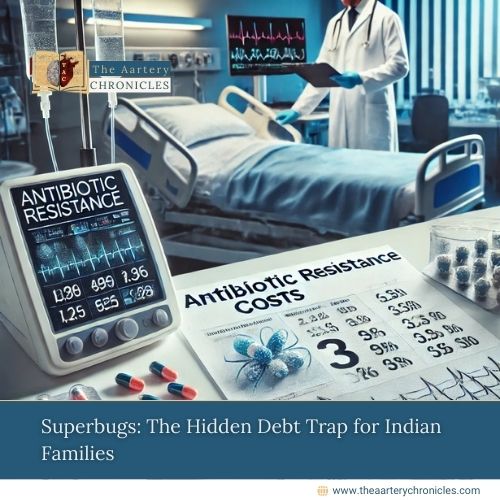

Superbugs: The Hidden Debt Trap for Indian Families
Antibiotic resistance, a growing concern in India, is forcing families into debt to manage the high costs of treatment. A recent study by the Indian Council of Medical Research (ICMR), published in the medical journal BMJ Open, highlights the alarming financial burden caused by infections that are resistant to antibiotics.
The Rising Cost of Treating Resistant Infections
According to the study, treatment in private hospitals for drug-resistant bacterial infections can cost 10.6% more than treating infections that respond to standard antibiotics. These increased costs are driven by the need for newer, expensive drugs and extended stays in intensive care units (ICUs).
The financial impact is staggering. Nearly half (46.5%) of the patients surveyed had to borrow money to cover treatment expenses. Additionally, 33.1% of families dipped into their savings, reaching what experts call “grade 2 financial toxicity.” Alarmingly, some families were forced to cut back on food to manage medical costs, while 11.4% had to sell or mortgage their assets, indicating severe financial strain.
Cost Differences in Hospitals
The study analyzed data from eight hospitals across India and revealed significant cost disparities. Treating drug-resistant infections in private hospitals costs an average of $3,382, compared to just $215 in charity hospitals. Pharmaceutical costs were identified as the primary contributor to these expenses.
Expert Insights on Antibiotic Resistance
Dr. Kamini Walia, a senior ICMR scientist and one of the study’s authors, emphasized the critical impact of drug-resistant pathogens. The expense of treating illnesses is already expensive in India, but it increases dramatically when antibiotic resistance is present,” she noted.
Dr. Rahul Pandit, an intensivist at H N Reliance Hospital, Mumbai, pointed out that antibiotic resistance is no longer confined to hospitals; it is now spreading in the community. Misuse of antibiotics in both human health and poultry farming is exacerbating the problem.
The Need for Stewardship Programs
To combat this crisis, experts stress the importance of antibiotic stewardship programs. These initiatives promote the responsible use of antibiotics to curb resistance. While many hospitals have adopted such programs thanks to government efforts, sustaining them remains a challenge.
Conclusion
Antibiotic resistance is not just a health crisis—it is a financial one, deeply affecting Indian families. The findings of this ICMR study underscore the urgent need for stronger policies, public awareness, and sustained efforts to mitigate the growing threat of superbugs. Without immediate action, the combined medical and financial toll of antibiotic resistance will only continue to rise.
Source: Inputs from various media Sources
I’m a pharmacist with a strong background in health sciences. I hold a BSc from Delhi University and a pharmacy degree from PDM University. I write articles and daily health news while interviewing doctors to bring you the latest insights. In my free time, you’ll find me at the gym or lost in a sci-fi novel.









